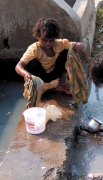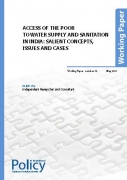/topics/treatment-and-purification
Treatment and Purification
Benchmarking local government performance on rural sanitation in Himachal Pradesh - A learning note by WSP
Posted on 06 Jan, 2011 06:43 AMThis document deals with benchmarking local government performance on rural sanitation in Himachal Pradesh. To strengthen outcome-focused management of the rural sanitation sector in India, the Water and Sanitation Program’s (WSP) Global Scaling Up Sanitation Project, in partnership with the Government of Himachal Pradesh, developed a five-step process to monitor and benchmark performance on a monthly basis across all twelve districts in the state. Applied at the local government (district) level, this process has proven to be an effective approach, one that can improve reporting, monitoring, and performance.
Maharashtra Groundwater (Development and Management) Bill (2009)
Posted on 05 Jan, 2011 07:32 PMThe Maharashtra Groundwater (Development and Management) Bill, 2009 aims to facilitate and ensure sustainable and adequate supply of groundwater of prescribed quality, for various category of users, through supply and demand management measures, protecting public drinking water sources and to establish the State Groundwater Authority and District Level Authorities to manage and to regulate, with community participation, the exploitation of groundwater within the State of Maharashtra.
Guidelines for water safety plans for rural water supply systems by the Sulabh International Academy of Environmental Sanitation
Posted on 27 Dec, 2010 07:20 PMThis document by the Sulabh International Academy of Environmental Sanitation presents the guidelines for water safety plans for rural water supply systems. The revised National Rural Drinking Water Programme (NRDWP) Guidelines 2009-2012 issued by Rajiv Gandhi National Drinking Water Mission, Department of Drinking Water and Sanitation has shifted the focus from source development and installation of water supply system for providing drinking water supply to rural household to focus on development of village security plan.
Preparation of strategic plan for rural drinking water sector in India – A draft discussion paper by the Department of Drinking Water Supply
Posted on 26 Dec, 2010 07:27 AMThis draft discussion paper by the Department of Drinking Water Supply (Ministry of Rural Development) deals with the preparation of strategic plan for rural drinking water sector in India. The Government of India introduced the Accelerated Rural Water Supply Programme (ARWSP) in 1972–73 to support States and UTs with financial and technical assistance to implement drinking water supply schemes in order to accelerate the pace of coverage across rural India.
The economic impacts of inadequate sanitation in India: Rs. 2.4 Trillion equivalent of 6.4 per cent of GDP – A report by WSP
Posted on 24 Dec, 2010 09:27 AM This study report by the Water and Sanitation Programme (WSP), a global partnership administered by the World Bank suggests that inadequate sanitation causes India considerable economic losses, equivalent to 6.4 per cent of India's GDP in 2006 at Rs. 2.4 Trillion. It analyzed the evidence on the adverse economic impacts of inadequate sanitation, which include costs associated with death and disease, accessing and treating water, and losses in education, productivity, time, and tourism. The findings are based on 2006 figures, although a similar magnitude of losses is likely in later years.
This study report by the Water and Sanitation Programme (WSP), a global partnership administered by the World Bank suggests that inadequate sanitation causes India considerable economic losses, equivalent to 6.4 per cent of India's GDP in 2006 at Rs. 2.4 Trillion. It analyzed the evidence on the adverse economic impacts of inadequate sanitation, which include costs associated with death and disease, accessing and treating water, and losses in education, productivity, time, and tourism. The findings are based on 2006 figures, although a similar magnitude of losses is likely in later years.
The study focused on the safe management of human excreta and associated hygiene behavior. The methodology adopted by the study included disaggregating the economic impacts of inadequate sanitation into health-related impacts including premature deaths, costs of treating diseases, and productive time lost due to illnesses; domestic water-related impacts including household treatment of water, and money and time costs to obtain safe water; welfare losses including additional time spent by people for accessing toilets or open defecation sites, and girls having to miss school, and women not going to work; and the loss of potential tourism owing to inadequate sanitation.
Data on incidence (e.g. diarrheal diseases, deaths, etc.) were compiled from national sources (National Family Health Survey, WHO Demographic and Health Surveys, and other Govt. of India sources). Based on scientific literature, attribution factors were used to estimate the populations impacted by inadequate sanitation. Economic valuation was carried out using costs/prices based on secondary studies.
Access of the poor to water supply and sanitation in India - Salient concepts, issues and cases by the International Policy Centre for Inclusive Growth
Posted on 20 Dec, 2010 10:04 PM This paper by the International Policy Centre for Inclusive Growth deals with access of the poor to water supply and sanitation in India. It argues that economic, technical, institutional as well as social factors constrain access to safe drinking water and proper sanitation in India for both the urban and rural poor, and that coverage figures do not reflect this restricted access. It finds that, increasingly, communities are being required to manage their own water and sanitation schemes, not just in rural areas but in urban ones as well.
This paper by the International Policy Centre for Inclusive Growth deals with access of the poor to water supply and sanitation in India. It argues that economic, technical, institutional as well as social factors constrain access to safe drinking water and proper sanitation in India for both the urban and rural poor, and that coverage figures do not reflect this restricted access. It finds that, increasingly, communities are being required to manage their own water and sanitation schemes, not just in rural areas but in urban ones as well.
The paper deals with domestic water supply and sanitation and presents a historical overview of the phenomenon in rural and urban India. This is followed by a critique of available figures for coverage which, it is contended, seem exaggerated because they do not account for the several constraints to access. It addresses the specific institutional problems faced in the public sector delivery of these two utilities in India apart from dealing with the parallel yet thus far limited presence of the private sector in these twin arenas.
"Gujarat farmers fight against climate change: Adopt technoloxxgy to conserve resources and maximize benefits" : News roundup (15-21 October 2010)
Posted on 22 Oct, 2010 11:25 AMClimate Change
Takeaways from NEERI brainstorming workshop - Water technology developers and other stakeholders
Posted on 11 Oct, 2010 03:21 AMThe National Environment Engineering Research Institute (NEERI) is a premier CSIR laboratory. On September 7th, NEERI held a brainstorming workshop entitled "Interface between water technology developers and other stakeholders”. The purpose of the workshop was to engage better with other players involved with bringing scientific innovation in the water sector to reach large numbers of people who need the innovations. Attendees included scientists from many CSIR laboratories involved with water research, senior central government officials from the Rural Water Supply Department and the Dept of Science and Technology, State government officials, representatives from leading corporate houses including Eureka Forbes and Unilever and NGOs.
Multi stage aerobic bio reactor for sewage treatment
Posted on 01 Oct, 2010 10:13 PMAbout CAT “MAR” (Multi Stage Aerobic Bio Reactor)
This reactor was developed with the aim to overcome the main problem associated with SBR, MBR & FABBR, i.e.,
- The plugging & clogging of filter and
- Wash out microbes from the reactor
Analysis of the UN General Assembly's Resolution on Right to Water and Sanitation
Posted on 30 Sep, 2010 06:47 PMThe historic UN General Assembly Resolution declaring Water and Sanitation as a Right, was passed on the 28th July 2010.
What is surprising is the complete silence to this UN Resolution from some of the countries who have been traditional champions of human rights, in terms of celebrating it as a historic achievement in advocating a basic right to water and sanitation. Instead some of them went one step short of openly opposing and vetoing the UN Resolution and have heaped criticism on Bolivia for tabling this UN Resolution.





